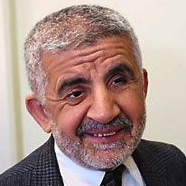A Humble Intellectual Giant

In 2012, Prof. Mahmoud Ayoub (centre) was presented the Distinguished Scholar Award by (now late) Dr Jamal al-Barzinji, vice president of International Institute of Islamic Thought (IIIT) and also a former board member of the Hartford Seminary (right), and Dr Abubaker al-Shingieti, former IIIT executive director (Photo © IIIT)
January/February 2022
The scores of international Muslim graduates from Temple University’s Department of Religion have now been orphaned twice: first when Prof. Ismail al Faruqi passed away in 1986 and now, with Prof. Mahmoud Ayoub’s death on Oct. 31, 2021, in Montreal.
Ayoub, who hailed from the mixed Muslim–Christian town of Ain Qana, South Lebanon, was born blind. As a special needs child, he attended a British Presbyterian missionary school for the blind. His intelligent mind and desire to learn, know the world and seek education left him unsatisfied with the education his school offered. He described his early learning experience as “the school authorities did not really have an educational program for us, what they wanted to do mainly was to make us Christians …” As a young zealous Christian, he later joined an American Southern Baptist Church to reach others with the Gospel. All of this created great tension with his family, especially his devout Muslim father, but also gave him a unique insight into Christianity and Muslim-Christian relations, a field of study and research to which he made a lasting and unique contribution. Ayoub reverted to Islam during his university studies.
His gentle soul, kindheartedness and concern for his family and students’ well-being made him a friend, father and teacher.
He enjoyed international recognition and left behind an ever-lasting legacy in the field of Islam and comparative religion. His holistic scholarship, which plumbed the depths of the Quran, Christian theology, the study of world religions and other areas, was characterized by its critical, integrated, rational and pluralistic approaches.
Before beginning his academic career, Ayoub spent years becoming credentialed – B.A. (philosophy, American University of Beirut, 1964); M.A. (religious thought, University of Pennsylvania, 1966) and PhD (history of religion, Harvard University, 1975). His doctoral advisor was Prof. Annemarie Schimmel, and his published dissertation, “Redemptive Suffering in Islam: A Study of the Devotional Aspects of Ashura’ in Twelver Shiism in the Middle Ages,” is considered a classic in the field.
From 1988 to 2008, he was professor and director of Islamic studies in Temple University’s Department of Religion, an adjunct professor at Hartford Seminary’s Duncan Black Macdonald Center, a research fellow at the University of Pennsylvania’s Middle East Center and the Tolson visiting professor at Berkeley’s Pacific School of Religion.
In 1998, Ayoub helped devise and launch a graduate master’s-level program in Muslim-Christian relations and comparative religion at the University of Balamand’s (Lebanon) Center for Christian-Muslim Studies. Before coming to Temple University, he taught at San Diego State University, the University of Toronto and McGill University. In 1999, he played a central role in establishing Yogyakarta’s (Indonesia) Temple-Gadjah Mada University’s Comparative Religion Program and lectured there each summer.
After retiring from Temple University, Ayoub was appointed faculty associate of Hartford Seminary’s Shi’ite Islam and Christian-Muslim Relations and co-director of Georgetown University’s Duncan Black MacDonald Center for the Study of Islam and Christian-Muslim Relations.
In 2016, he was the force behind establishing the Imam Ali Chair for the Study of Shi’i Islam and Dialogue Among Islamic Legal School at the Hartford International University for Religion and Peace, the first academic chair in North America dedicated to Shi’i studies.
Throughout his academic career, Ayoub received awards and scholarships, including the Kent Doctoral Fellowship and the Canada Council Fellowship. He also participated in the Fulbright Exchange of Scholars program for Malaysia. and researched Christian-Muslim relations in Egypt and Lebanon, also on a Fulbright scholarship.
Among his publications are “Redemptive Suffering in Islam” (1978), “The Qur’an and Its Interpreters”: vol. I (1984) and vol. II (1992); “Studies in Christian-Muslim Relations” (in Arabic) 2 vols. (2000), “Islam: Faith and History” (2005), “A Muslim View of Christianity: Essays on Dialogue” (2007) and “The Crisis of Muslim History: Religion and Politics in Early Islam” (2014).
For him, the heart of Islam is its moral system, which is based on “No one of you will be a true believer until he loves for his brother what he loves for himself” (“Sunan Ibn Majah,” vol. 1, book 1, hadith 66).
This intra-Muslim pluralist described himself as “a very peaceful person, I don’t like to dispute with anybody.” Born into a Shia family, he would lead his Sunni students in the Sunni way of prayer! A religious pluralist, he respected all religions by adhering to the Quranic teaching of the best approach to interreligious relations is to “compete with one another in doing good works” (2:148)
Dr. Ayoub and his wife Dasmalina (Lina) are remembered by all who knew them for their warm hospitality and kindness. His two children, Firas and Sommayyeh, survive him.
(Contributed by Assoc. Prof. Dr Imtiyaz Yusuf, coordinator, Islamization of Human Knowledge, and coordinator, Islam and Buddhism Program, International Institute of Islamic Thought and Civilisation, [ISTAC-IIUM] Kuala Lumpur)